Comparison of current drug control policies, UK vs Portugal
VerifiedAdded on 2023/06/10
|12
|2603
|327
AI Summary
This essay compares and contrasts the current drug control policies in the UK and Portugal, focusing on legislation, efficacy, and societal impact. It also discusses the changing nature of drug-related crime and the cost of drug abuse on society.
Contribute Materials
Your contribution can guide someone’s learning journey. Share your
documents today.

Secure Best Marks with AI Grader
Need help grading? Try our AI Grader for instant feedback on your assignments.
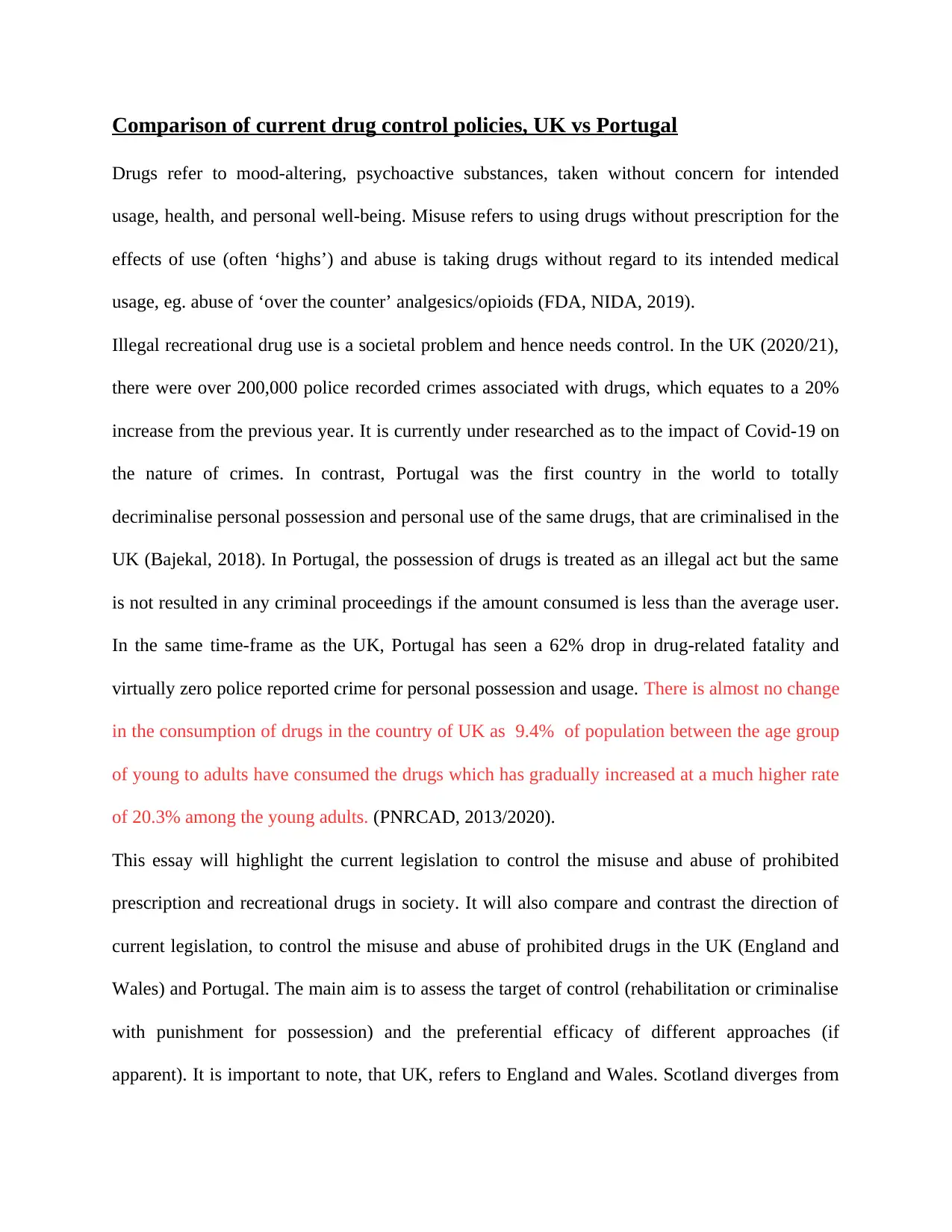
Comparison of current drug control policies, UK vs Portugal
Drugs refer to mood-altering, psychoactive substances, taken without concern for intended
usage, health, and personal well-being. Misuse refers to using drugs without prescription for the
effects of use (often ‘highs’) and abuse is taking drugs without regard to its intended medical
usage, eg. abuse of ‘over the counter’ analgesics/opioids (FDA, NIDA, 2019).
Illegal recreational drug use is a societal problem and hence needs control. In the UK (2020/21),
there were over 200,000 police recorded crimes associated with drugs, which equates to a 20%
increase from the previous year. It is currently under researched as to the impact of Covid-19 on
the nature of crimes. In contrast, Portugal was the first country in the world to totally
decriminalise personal possession and personal use of the same drugs, that are criminalised in the
UK (Bajekal, 2018). In Portugal, the possession of drugs is treated as an illegal act but the same
is not resulted in any criminal proceedings if the amount consumed is less than the average user.
In the same time-frame as the UK, Portugal has seen a 62% drop in drug-related fatality and
virtually zero police reported crime for personal possession and usage. There is almost no change
in the consumption of drugs in the country of UK as 9.4% of population between the age group
of young to adults have consumed the drugs which has gradually increased at a much higher rate
of 20.3% among the young adults. (PNRCAD, 2013/2020).
This essay will highlight the current legislation to control the misuse and abuse of prohibited
prescription and recreational drugs in society. It will also compare and contrast the direction of
current legislation, to control the misuse and abuse of prohibited drugs in the UK (England and
Wales) and Portugal. The main aim is to assess the target of control (rehabilitation or criminalise
with punishment for possession) and the preferential efficacy of different approaches (if
apparent). It is important to note, that UK, refers to England and Wales. Scotland diverges from
Drugs refer to mood-altering, psychoactive substances, taken without concern for intended
usage, health, and personal well-being. Misuse refers to using drugs without prescription for the
effects of use (often ‘highs’) and abuse is taking drugs without regard to its intended medical
usage, eg. abuse of ‘over the counter’ analgesics/opioids (FDA, NIDA, 2019).
Illegal recreational drug use is a societal problem and hence needs control. In the UK (2020/21),
there were over 200,000 police recorded crimes associated with drugs, which equates to a 20%
increase from the previous year. It is currently under researched as to the impact of Covid-19 on
the nature of crimes. In contrast, Portugal was the first country in the world to totally
decriminalise personal possession and personal use of the same drugs, that are criminalised in the
UK (Bajekal, 2018). In Portugal, the possession of drugs is treated as an illegal act but the same
is not resulted in any criminal proceedings if the amount consumed is less than the average user.
In the same time-frame as the UK, Portugal has seen a 62% drop in drug-related fatality and
virtually zero police reported crime for personal possession and usage. There is almost no change
in the consumption of drugs in the country of UK as 9.4% of population between the age group
of young to adults have consumed the drugs which has gradually increased at a much higher rate
of 20.3% among the young adults. (PNRCAD, 2013/2020).
This essay will highlight the current legislation to control the misuse and abuse of prohibited
prescription and recreational drugs in society. It will also compare and contrast the direction of
current legislation, to control the misuse and abuse of prohibited drugs in the UK (England and
Wales) and Portugal. The main aim is to assess the target of control (rehabilitation or criminalise
with punishment for possession) and the preferential efficacy of different approaches (if
apparent). It is important to note, that UK, refers to England and Wales. Scotland diverges from
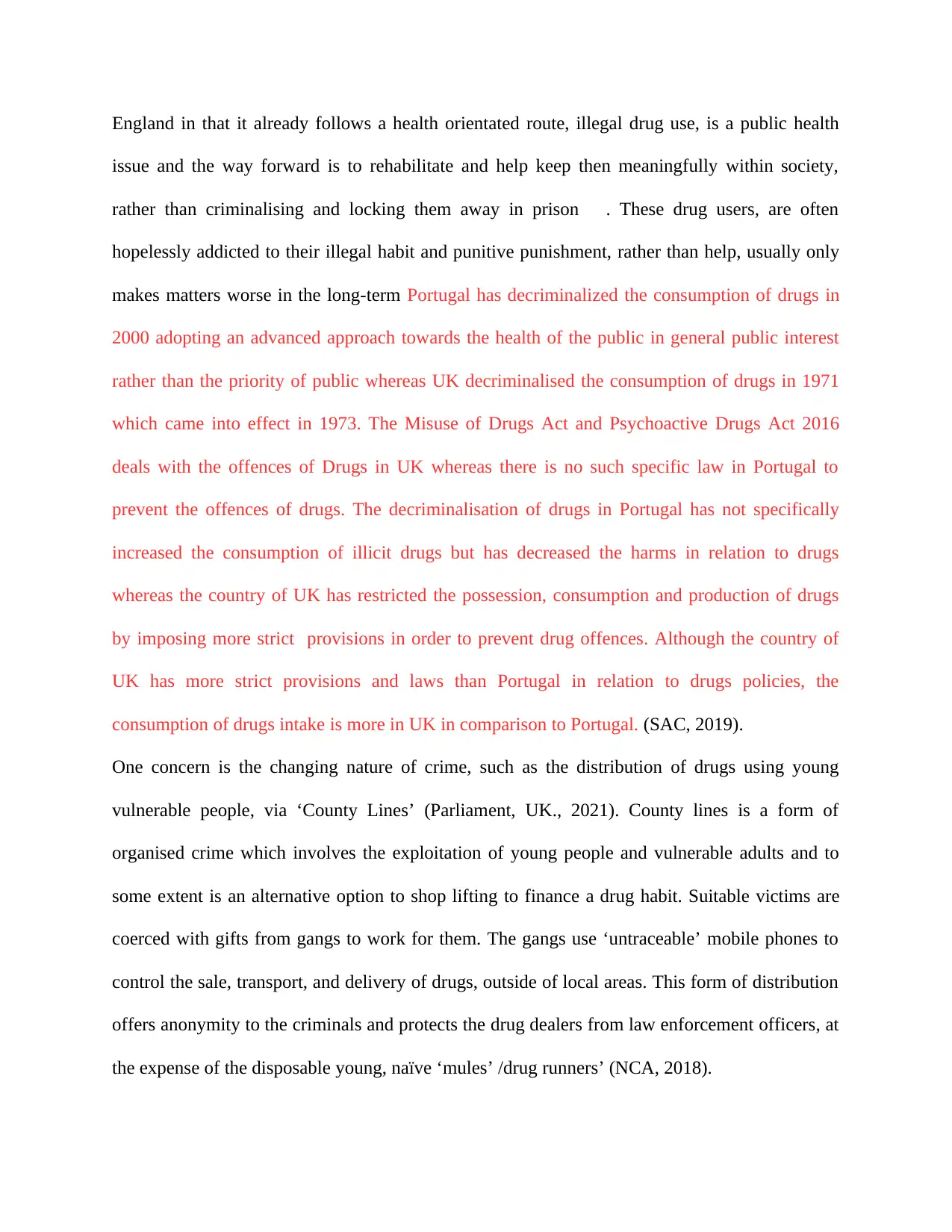
England in that it already follows a health orientated route, illegal drug use, is a public health
issue and the way forward is to rehabilitate and help keep then meaningfully within society,
rather than criminalising and locking them away in prison . These drug users, are often
hopelessly addicted to their illegal habit and punitive punishment, rather than help, usually only
makes matters worse in the long-term Portugal has decriminalized the consumption of drugs in
2000 adopting an advanced approach towards the health of the public in general public interest
rather than the priority of public whereas UK decriminalised the consumption of drugs in 1971
which came into effect in 1973. The Misuse of Drugs Act and Psychoactive Drugs Act 2016
deals with the offences of Drugs in UK whereas there is no such specific law in Portugal to
prevent the offences of drugs. The decriminalisation of drugs in Portugal has not specifically
increased the consumption of illicit drugs but has decreased the harms in relation to drugs
whereas the country of UK has restricted the possession, consumption and production of drugs
by imposing more strict provisions in order to prevent drug offences. Although the country of
UK has more strict provisions and laws than Portugal in relation to drugs policies, the
consumption of drugs intake is more in UK in comparison to Portugal. (SAC, 2019).
One concern is the changing nature of crime, such as the distribution of drugs using young
vulnerable people, via ‘County Lines’ (Parliament, UK., 2021). County lines is a form of
organised crime which involves the exploitation of young people and vulnerable adults and to
some extent is an alternative option to shop lifting to finance a drug habit. Suitable victims are
coerced with gifts from gangs to work for them. The gangs use ‘untraceable’ mobile phones to
control the sale, transport, and delivery of drugs, outside of local areas. This form of distribution
offers anonymity to the criminals and protects the drug dealers from law enforcement officers, at
the expense of the disposable young, naïve ‘mules’ /drug runners’ (NCA, 2018).
issue and the way forward is to rehabilitate and help keep then meaningfully within society,
rather than criminalising and locking them away in prison . These drug users, are often
hopelessly addicted to their illegal habit and punitive punishment, rather than help, usually only
makes matters worse in the long-term Portugal has decriminalized the consumption of drugs in
2000 adopting an advanced approach towards the health of the public in general public interest
rather than the priority of public whereas UK decriminalised the consumption of drugs in 1971
which came into effect in 1973. The Misuse of Drugs Act and Psychoactive Drugs Act 2016
deals with the offences of Drugs in UK whereas there is no such specific law in Portugal to
prevent the offences of drugs. The decriminalisation of drugs in Portugal has not specifically
increased the consumption of illicit drugs but has decreased the harms in relation to drugs
whereas the country of UK has restricted the possession, consumption and production of drugs
by imposing more strict provisions in order to prevent drug offences. Although the country of
UK has more strict provisions and laws than Portugal in relation to drugs policies, the
consumption of drugs intake is more in UK in comparison to Portugal. (SAC, 2019).
One concern is the changing nature of crime, such as the distribution of drugs using young
vulnerable people, via ‘County Lines’ (Parliament, UK., 2021). County lines is a form of
organised crime which involves the exploitation of young people and vulnerable adults and to
some extent is an alternative option to shop lifting to finance a drug habit. Suitable victims are
coerced with gifts from gangs to work for them. The gangs use ‘untraceable’ mobile phones to
control the sale, transport, and delivery of drugs, outside of local areas. This form of distribution
offers anonymity to the criminals and protects the drug dealers from law enforcement officers, at
the expense of the disposable young, naïve ‘mules’ /drug runners’ (NCA, 2018).
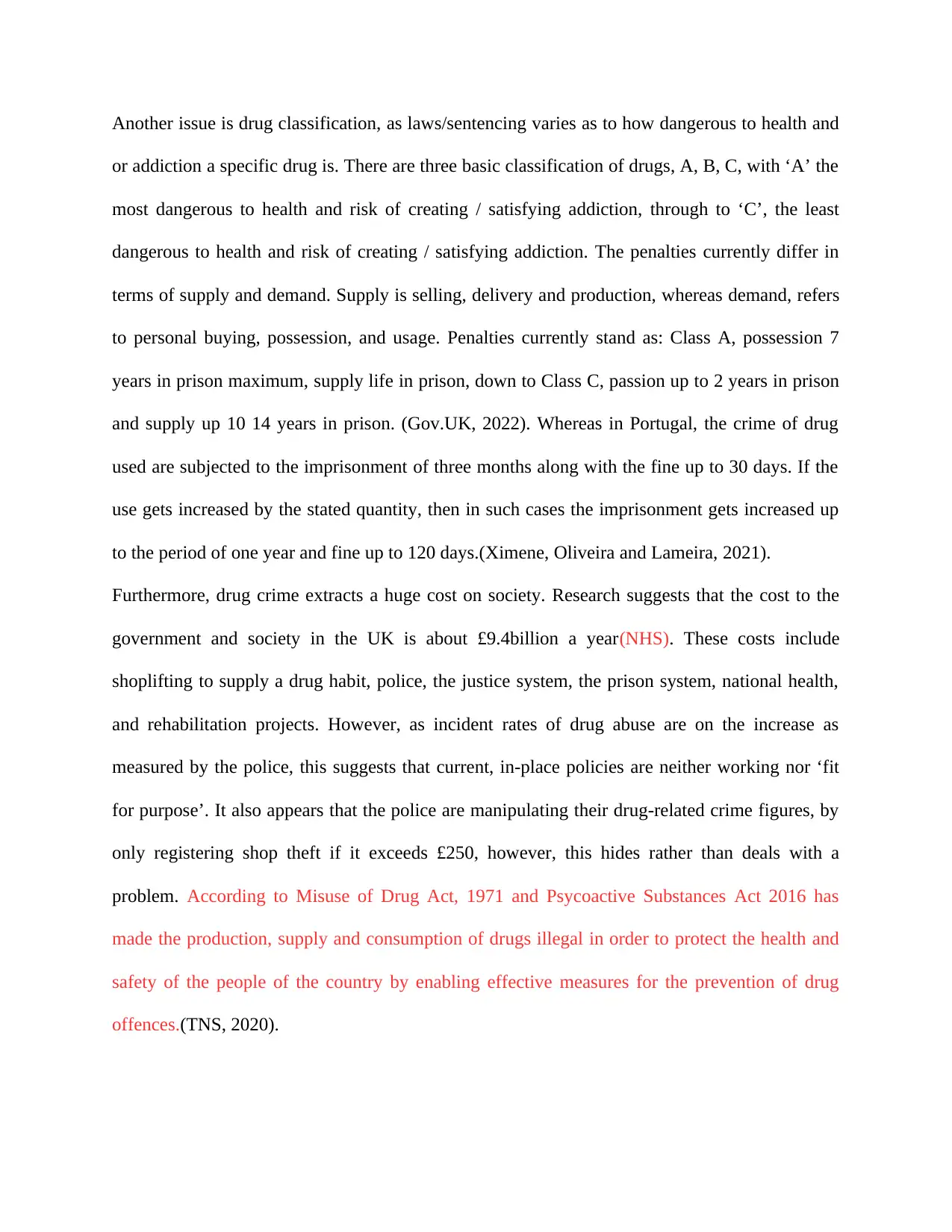
Another issue is drug classification, as laws/sentencing varies as to how dangerous to health and
or addiction a specific drug is. There are three basic classification of drugs, A, B, C, with ‘A’ the
most dangerous to health and risk of creating / satisfying addiction, through to ‘C’, the least
dangerous to health and risk of creating / satisfying addiction. The penalties currently differ in
terms of supply and demand. Supply is selling, delivery and production, whereas demand, refers
to personal buying, possession, and usage. Penalties currently stand as: Class A, possession 7
years in prison maximum, supply life in prison, down to Class C, passion up to 2 years in prison
and supply up 10 14 years in prison. (Gov.UK, 2022). Whereas in Portugal, the crime of drug
used are subjected to the imprisonment of three months along with the fine up to 30 days. If the
use gets increased by the stated quantity, then in such cases the imprisonment gets increased up
to the period of one year and fine up to 120 days.(Ximene, Oliveira and Lameira, 2021).
Furthermore, drug crime extracts a huge cost on society. Research suggests that the cost to the
government and society in the UK is about £9.4billion a year(NHS). These costs include
shoplifting to supply a drug habit, police, the justice system, the prison system, national health,
and rehabilitation projects. However, as incident rates of drug abuse are on the increase as
measured by the police, this suggests that current, in-place policies are neither working nor ‘fit
for purpose’. It also appears that the police are manipulating their drug-related crime figures, by
only registering shop theft if it exceeds £250, however, this hides rather than deals with a
problem. According to Misuse of Drug Act, 1971 and Psycoactive Substances Act 2016 has
made the production, supply and consumption of drugs illegal in order to protect the health and
safety of the people of the country by enabling effective measures for the prevention of drug
offences.(TNS, 2020).
or addiction a specific drug is. There are three basic classification of drugs, A, B, C, with ‘A’ the
most dangerous to health and risk of creating / satisfying addiction, through to ‘C’, the least
dangerous to health and risk of creating / satisfying addiction. The penalties currently differ in
terms of supply and demand. Supply is selling, delivery and production, whereas demand, refers
to personal buying, possession, and usage. Penalties currently stand as: Class A, possession 7
years in prison maximum, supply life in prison, down to Class C, passion up to 2 years in prison
and supply up 10 14 years in prison. (Gov.UK, 2022). Whereas in Portugal, the crime of drug
used are subjected to the imprisonment of three months along with the fine up to 30 days. If the
use gets increased by the stated quantity, then in such cases the imprisonment gets increased up
to the period of one year and fine up to 120 days.(Ximene, Oliveira and Lameira, 2021).
Furthermore, drug crime extracts a huge cost on society. Research suggests that the cost to the
government and society in the UK is about £9.4billion a year(NHS). These costs include
shoplifting to supply a drug habit, police, the justice system, the prison system, national health,
and rehabilitation projects. However, as incident rates of drug abuse are on the increase as
measured by the police, this suggests that current, in-place policies are neither working nor ‘fit
for purpose’. It also appears that the police are manipulating their drug-related crime figures, by
only registering shop theft if it exceeds £250, however, this hides rather than deals with a
problem. According to Misuse of Drug Act, 1971 and Psycoactive Substances Act 2016 has
made the production, supply and consumption of drugs illegal in order to protect the health and
safety of the people of the country by enabling effective measures for the prevention of drug
offences.(TNS, 2020).
Secure Best Marks with AI Grader
Need help grading? Try our AI Grader for instant feedback on your assignments.
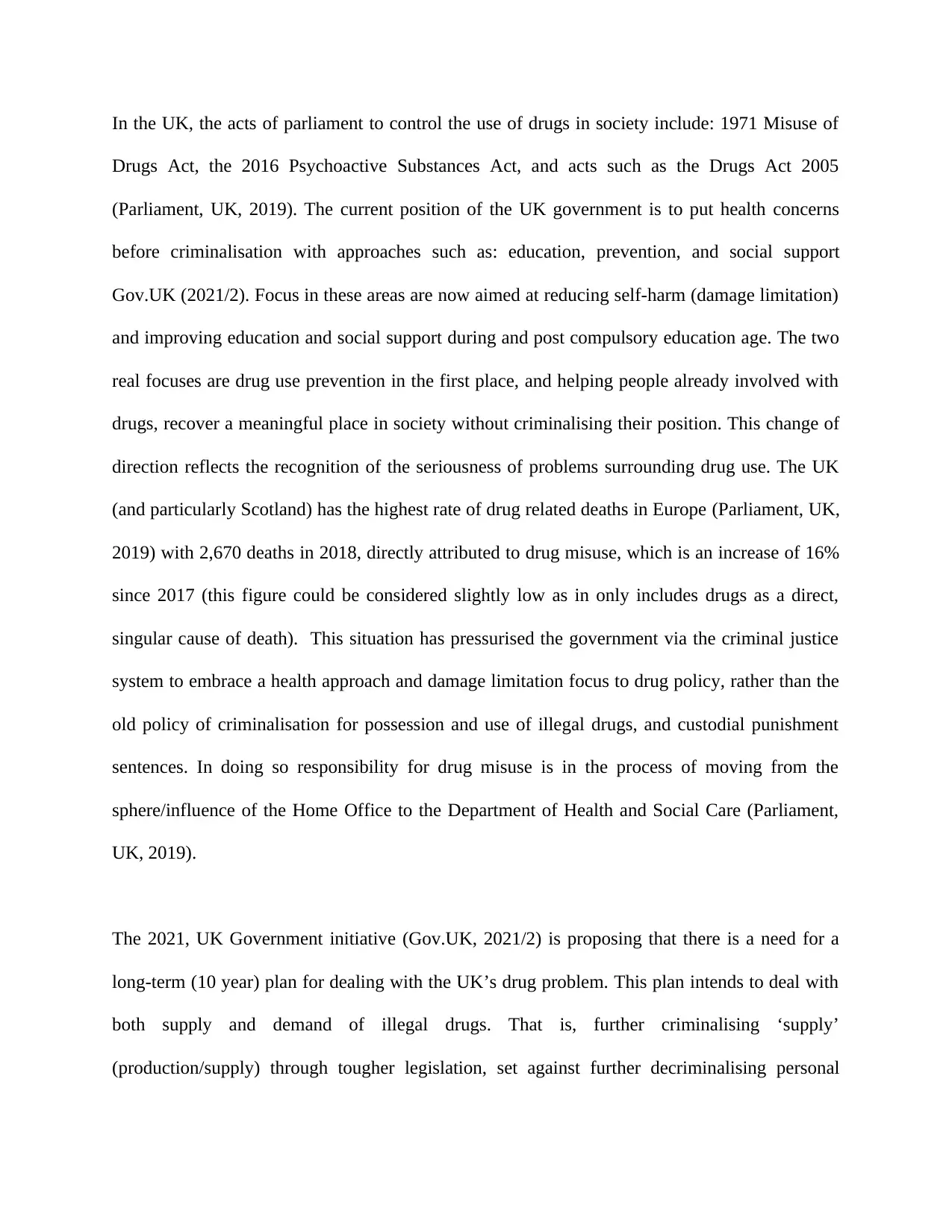
In the UK, the acts of parliament to control the use of drugs in society include: 1971 Misuse of
Drugs Act, the 2016 Psychoactive Substances Act, and acts such as the Drugs Act 2005
(Parliament, UK, 2019). The current position of the UK government is to put health concerns
before criminalisation with approaches such as: education, prevention, and social support
Gov.UK (2021/2). Focus in these areas are now aimed at reducing self-harm (damage limitation)
and improving education and social support during and post compulsory education age. The two
real focuses are drug use prevention in the first place, and helping people already involved with
drugs, recover a meaningful place in society without criminalising their position. This change of
direction reflects the recognition of the seriousness of problems surrounding drug use. The UK
(and particularly Scotland) has the highest rate of drug related deaths in Europe (Parliament, UK,
2019) with 2,670 deaths in 2018, directly attributed to drug misuse, which is an increase of 16%
since 2017 (this figure could be considered slightly low as in only includes drugs as a direct,
singular cause of death). This situation has pressurised the government via the criminal justice
system to embrace a health approach and damage limitation focus to drug policy, rather than the
old policy of criminalisation for possession and use of illegal drugs, and custodial punishment
sentences. In doing so responsibility for drug misuse is in the process of moving from the
sphere/influence of the Home Office to the Department of Health and Social Care (Parliament,
UK, 2019).
The 2021, UK Government initiative (Gov.UK, 2021/2) is proposing that there is a need for a
long-term (10 year) plan for dealing with the UK’s drug problem. This plan intends to deal with
both supply and demand of illegal drugs. That is, further criminalising ‘supply’
(production/supply) through tougher legislation, set against further decriminalising personal
Drugs Act, the 2016 Psychoactive Substances Act, and acts such as the Drugs Act 2005
(Parliament, UK, 2019). The current position of the UK government is to put health concerns
before criminalisation with approaches such as: education, prevention, and social support
Gov.UK (2021/2). Focus in these areas are now aimed at reducing self-harm (damage limitation)
and improving education and social support during and post compulsory education age. The two
real focuses are drug use prevention in the first place, and helping people already involved with
drugs, recover a meaningful place in society without criminalising their position. This change of
direction reflects the recognition of the seriousness of problems surrounding drug use. The UK
(and particularly Scotland) has the highest rate of drug related deaths in Europe (Parliament, UK,
2019) with 2,670 deaths in 2018, directly attributed to drug misuse, which is an increase of 16%
since 2017 (this figure could be considered slightly low as in only includes drugs as a direct,
singular cause of death). This situation has pressurised the government via the criminal justice
system to embrace a health approach and damage limitation focus to drug policy, rather than the
old policy of criminalisation for possession and use of illegal drugs, and custodial punishment
sentences. In doing so responsibility for drug misuse is in the process of moving from the
sphere/influence of the Home Office to the Department of Health and Social Care (Parliament,
UK, 2019).
The 2021, UK Government initiative (Gov.UK, 2021/2) is proposing that there is a need for a
long-term (10 year) plan for dealing with the UK’s drug problem. This plan intends to deal with
both supply and demand of illegal drugs. That is, further criminalising ‘supply’
(production/supply) through tougher legislation, set against further decriminalising personal
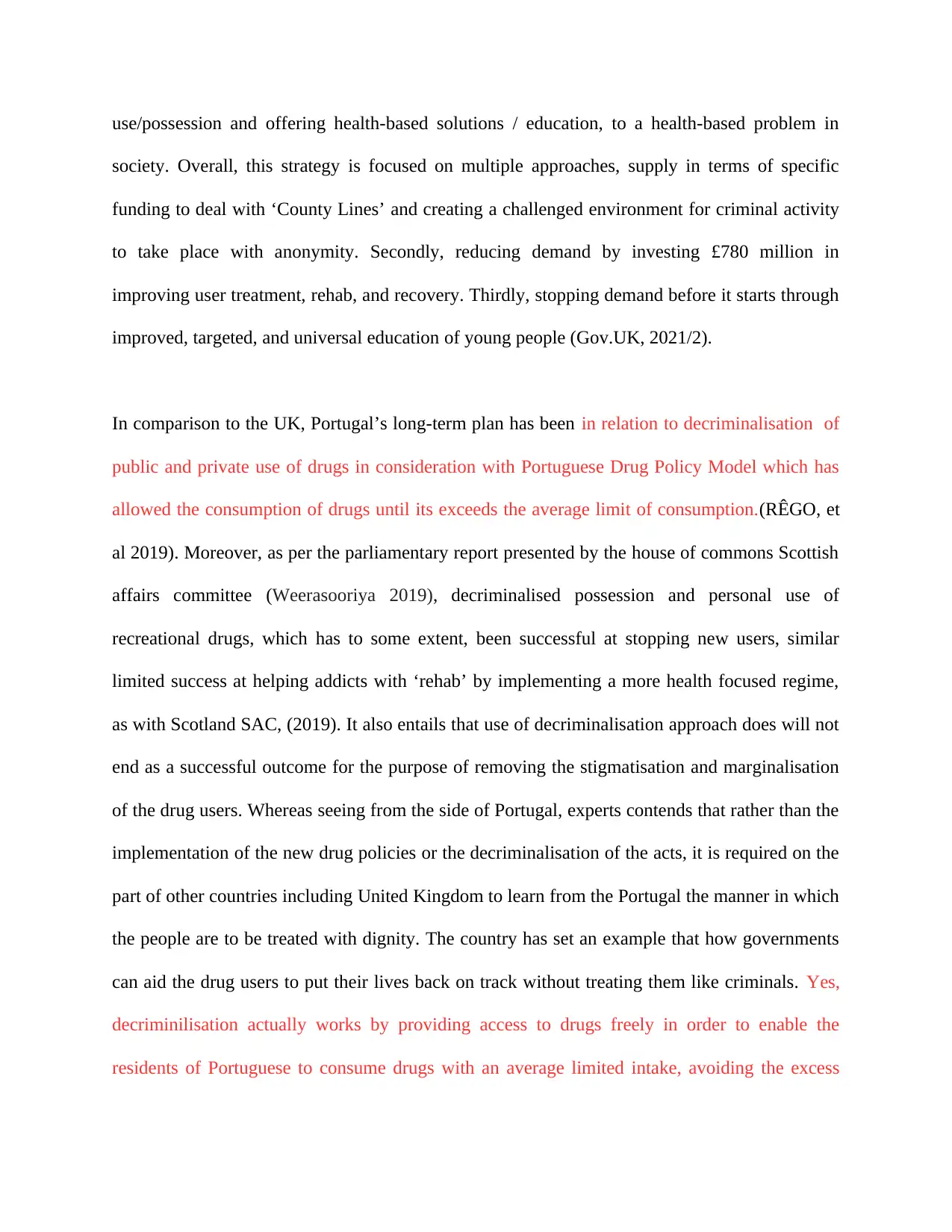
use/possession and offering health-based solutions / education, to a health-based problem in
society. Overall, this strategy is focused on multiple approaches, supply in terms of specific
funding to deal with ‘County Lines’ and creating a challenged environment for criminal activity
to take place with anonymity. Secondly, reducing demand by investing £780 million in
improving user treatment, rehab, and recovery. Thirdly, stopping demand before it starts through
improved, targeted, and universal education of young people (Gov.UK, 2021/2).
In comparison to the UK, Portugal’s long-term plan has been in relation to decriminalisation of
public and private use of drugs in consideration with Portuguese Drug Policy Model which has
allowed the consumption of drugs until its exceeds the average limit of consumption.(RÊGO, et
al 2019). Moreover, as per the parliamentary report presented by the house of commons Scottish
affairs committee (Weerasooriya 2019), decriminalised possession and personal use of
recreational drugs, which has to some extent, been successful at stopping new users, similar
limited success at helping addicts with ‘rehab’ by implementing a more health focused regime,
as with Scotland SAC, (2019). It also entails that use of decriminalisation approach does will not
end as a successful outcome for the purpose of removing the stigmatisation and marginalisation
of the drug users. Whereas seeing from the side of Portugal, experts contends that rather than the
implementation of the new drug policies or the decriminalisation of the acts, it is required on the
part of other countries including United Kingdom to learn from the Portugal the manner in which
the people are to be treated with dignity. The country has set an example that how governments
can aid the drug users to put their lives back on track without treating them like criminals. Yes,
decriminilisation actually works by providing access to drugs freely in order to enable the
residents of Portuguese to consume drugs with an average limited intake, avoiding the excess
society. Overall, this strategy is focused on multiple approaches, supply in terms of specific
funding to deal with ‘County Lines’ and creating a challenged environment for criminal activity
to take place with anonymity. Secondly, reducing demand by investing £780 million in
improving user treatment, rehab, and recovery. Thirdly, stopping demand before it starts through
improved, targeted, and universal education of young people (Gov.UK, 2021/2).
In comparison to the UK, Portugal’s long-term plan has been in relation to decriminalisation of
public and private use of drugs in consideration with Portuguese Drug Policy Model which has
allowed the consumption of drugs until its exceeds the average limit of consumption.(RÊGO, et
al 2019). Moreover, as per the parliamentary report presented by the house of commons Scottish
affairs committee (Weerasooriya 2019), decriminalised possession and personal use of
recreational drugs, which has to some extent, been successful at stopping new users, similar
limited success at helping addicts with ‘rehab’ by implementing a more health focused regime,
as with Scotland SAC, (2019). It also entails that use of decriminalisation approach does will not
end as a successful outcome for the purpose of removing the stigmatisation and marginalisation
of the drug users. Whereas seeing from the side of Portugal, experts contends that rather than the
implementation of the new drug policies or the decriminalisation of the acts, it is required on the
part of other countries including United Kingdom to learn from the Portugal the manner in which
the people are to be treated with dignity. The country has set an example that how governments
can aid the drug users to put their lives back on track without treating them like criminals. Yes,
decriminilisation actually works by providing access to drugs freely in order to enable the
residents of Portuguese to consume drugs with an average limited intake, avoiding the excess
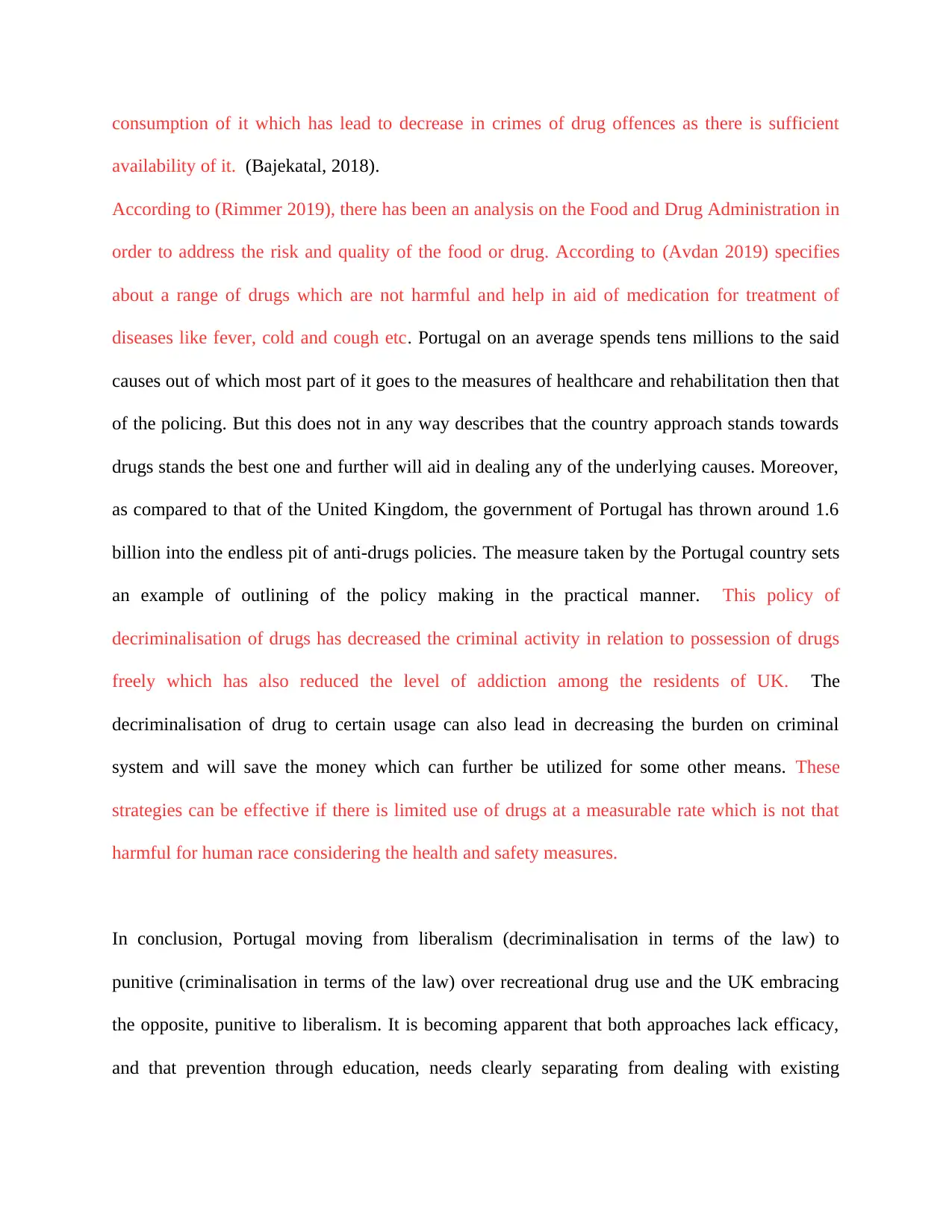
consumption of it which has lead to decrease in crimes of drug offences as there is sufficient
availability of it. (Bajekatal, 2018).
According to (Rimmer 2019), there has been an analysis on the Food and Drug Administration in
order to address the risk and quality of the food or drug. According to (Avdan 2019) specifies
about a range of drugs which are not harmful and help in aid of medication for treatment of
diseases like fever, cold and cough etc. Portugal on an average spends tens millions to the said
causes out of which most part of it goes to the measures of healthcare and rehabilitation then that
of the policing. But this does not in any way describes that the country approach stands towards
drugs stands the best one and further will aid in dealing any of the underlying causes. Moreover,
as compared to that of the United Kingdom, the government of Portugal has thrown around 1.6
billion into the endless pit of anti-drugs policies. The measure taken by the Portugal country sets
an example of outlining of the policy making in the practical manner. This policy of
decriminalisation of drugs has decreased the criminal activity in relation to possession of drugs
freely which has also reduced the level of addiction among the residents of UK. The
decriminalisation of drug to certain usage can also lead in decreasing the burden on criminal
system and will save the money which can further be utilized for some other means. These
strategies can be effective if there is limited use of drugs at a measurable rate which is not that
harmful for human race considering the health and safety measures.
In conclusion, Portugal moving from liberalism (decriminalisation in terms of the law) to
punitive (criminalisation in terms of the law) over recreational drug use and the UK embracing
the opposite, punitive to liberalism. It is becoming apparent that both approaches lack efficacy,
and that prevention through education, needs clearly separating from dealing with existing
availability of it. (Bajekatal, 2018).
According to (Rimmer 2019), there has been an analysis on the Food and Drug Administration in
order to address the risk and quality of the food or drug. According to (Avdan 2019) specifies
about a range of drugs which are not harmful and help in aid of medication for treatment of
diseases like fever, cold and cough etc. Portugal on an average spends tens millions to the said
causes out of which most part of it goes to the measures of healthcare and rehabilitation then that
of the policing. But this does not in any way describes that the country approach stands towards
drugs stands the best one and further will aid in dealing any of the underlying causes. Moreover,
as compared to that of the United Kingdom, the government of Portugal has thrown around 1.6
billion into the endless pit of anti-drugs policies. The measure taken by the Portugal country sets
an example of outlining of the policy making in the practical manner. This policy of
decriminalisation of drugs has decreased the criminal activity in relation to possession of drugs
freely which has also reduced the level of addiction among the residents of UK. The
decriminalisation of drug to certain usage can also lead in decreasing the burden on criminal
system and will save the money which can further be utilized for some other means. These
strategies can be effective if there is limited use of drugs at a measurable rate which is not that
harmful for human race considering the health and safety measures.
In conclusion, Portugal moving from liberalism (decriminalisation in terms of the law) to
punitive (criminalisation in terms of the law) over recreational drug use and the UK embracing
the opposite, punitive to liberalism. It is becoming apparent that both approaches lack efficacy,
and that prevention through education, needs clearly separating from dealing with existing
Paraphrase This Document
Need a fresh take? Get an instant paraphrase of this document with our AI Paraphraser
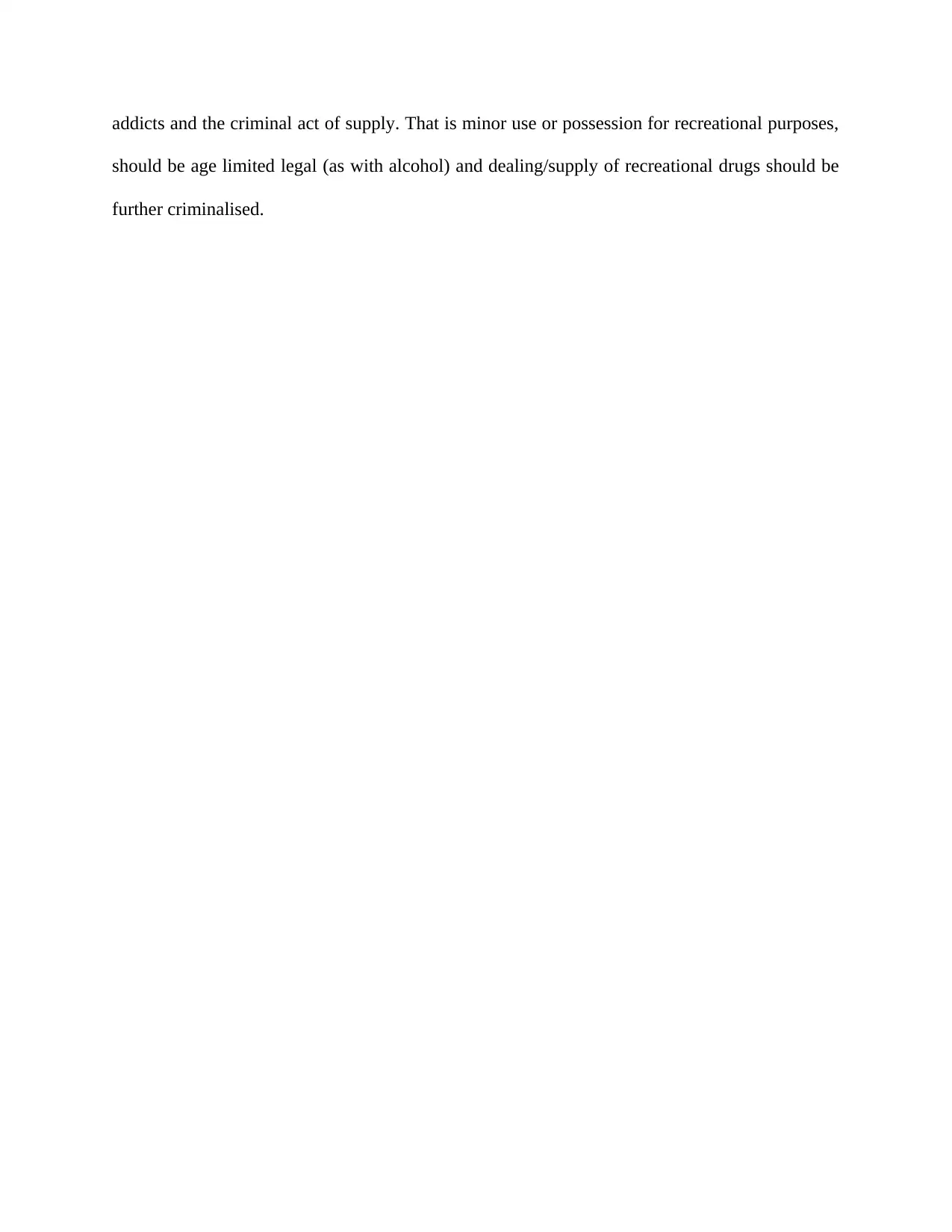
addicts and the criminal act of supply. That is minor use or possession for recreational purposes,
should be age limited legal (as with alcohol) and dealing/supply of recreational drugs should be
further criminalised.
should be age limited legal (as with alcohol) and dealing/supply of recreational drugs should be
further criminalised.
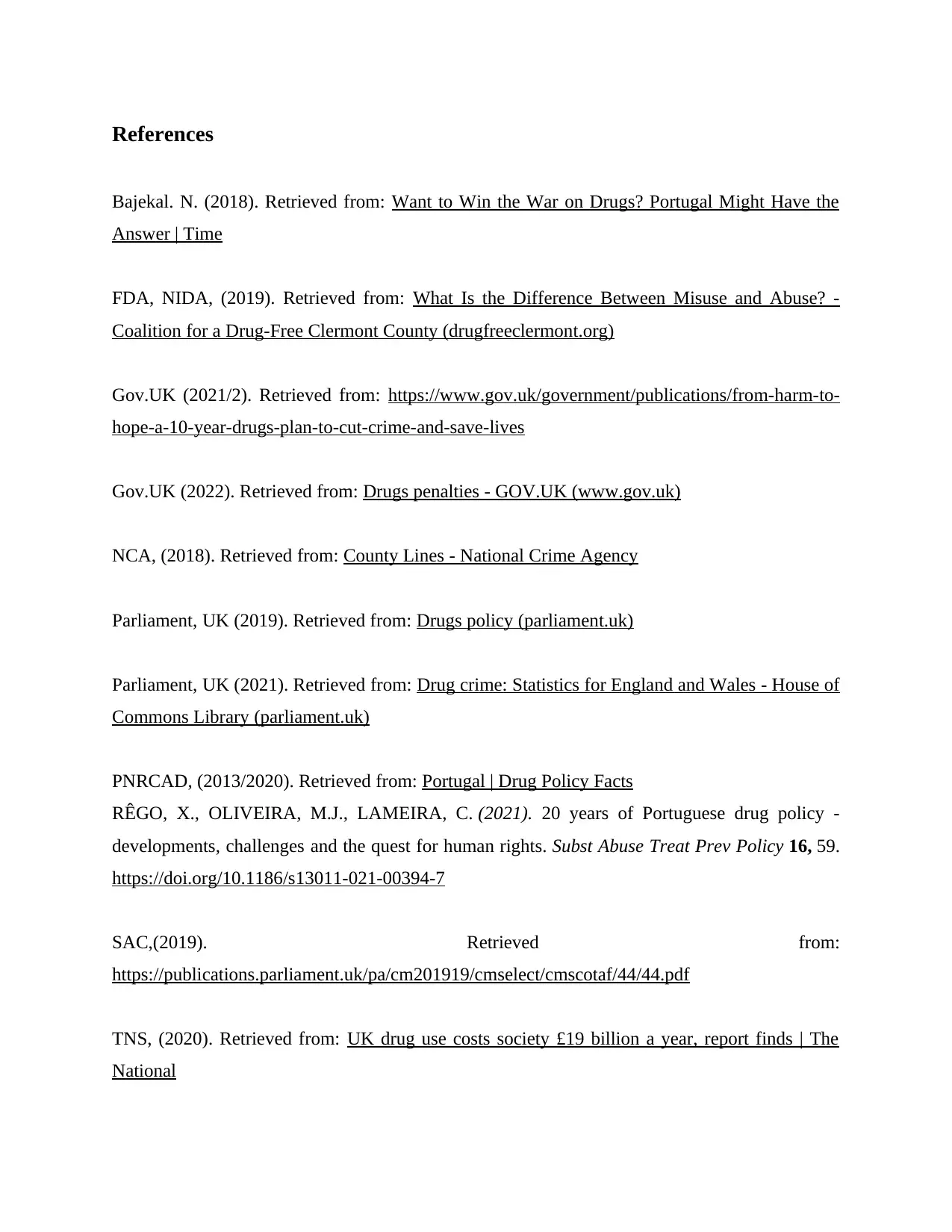
References
Bajekal. N. (2018). Retrieved from: Want to Win the War on Drugs? Portugal Might Have the
Answer | Time
FDA, NIDA, (2019). Retrieved from: What Is the Difference Between Misuse and Abuse? -
Coalition for a Drug-Free Clermont County (drugfreeclermont.org)
Gov.UK (2021/2). Retrieved from: https://www.gov.uk/government/publications/from-harm-to-
hope-a-10-year-drugs-plan-to-cut-crime-and-save-lives
Gov.UK (2022). Retrieved from: Drugs penalties - GOV.UK (www.gov.uk)
NCA, (2018). Retrieved from: County Lines - National Crime Agency
Parliament, UK (2019). Retrieved from: Drugs policy (parliament.uk)
Parliament, UK (2021). Retrieved from: Drug crime: Statistics for England and Wales - House of
Commons Library (parliament.uk)
PNRCAD, (2013/2020). Retrieved from: Portugal | Drug Policy Facts
RÊGO, X., OLIVEIRA, M.J., LAMEIRA, C. (2021). 20 years of Portuguese drug policy -
developments, challenges and the quest for human rights. Subst Abuse Treat Prev Policy 16, 59.
https://doi.org/10.1186/s13011-021-00394-7
SAC,(2019). Retrieved from:
https://publications.parliament.uk/pa/cm201919/cmselect/cmscotaf/44/44.pdf
TNS, (2020). Retrieved from: UK drug use costs society £19 billion a year, report finds | The
National
Bajekal. N. (2018). Retrieved from: Want to Win the War on Drugs? Portugal Might Have the
Answer | Time
FDA, NIDA, (2019). Retrieved from: What Is the Difference Between Misuse and Abuse? -
Coalition for a Drug-Free Clermont County (drugfreeclermont.org)
Gov.UK (2021/2). Retrieved from: https://www.gov.uk/government/publications/from-harm-to-
hope-a-10-year-drugs-plan-to-cut-crime-and-save-lives
Gov.UK (2022). Retrieved from: Drugs penalties - GOV.UK (www.gov.uk)
NCA, (2018). Retrieved from: County Lines - National Crime Agency
Parliament, UK (2019). Retrieved from: Drugs policy (parliament.uk)
Parliament, UK (2021). Retrieved from: Drug crime: Statistics for England and Wales - House of
Commons Library (parliament.uk)
PNRCAD, (2013/2020). Retrieved from: Portugal | Drug Policy Facts
RÊGO, X., OLIVEIRA, M.J., LAMEIRA, C. (2021). 20 years of Portuguese drug policy -
developments, challenges and the quest for human rights. Subst Abuse Treat Prev Policy 16, 59.
https://doi.org/10.1186/s13011-021-00394-7
SAC,(2019). Retrieved from:
https://publications.parliament.uk/pa/cm201919/cmselect/cmscotaf/44/44.pdf
TNS, (2020). Retrieved from: UK drug use costs society £19 billion a year, report finds | The
National
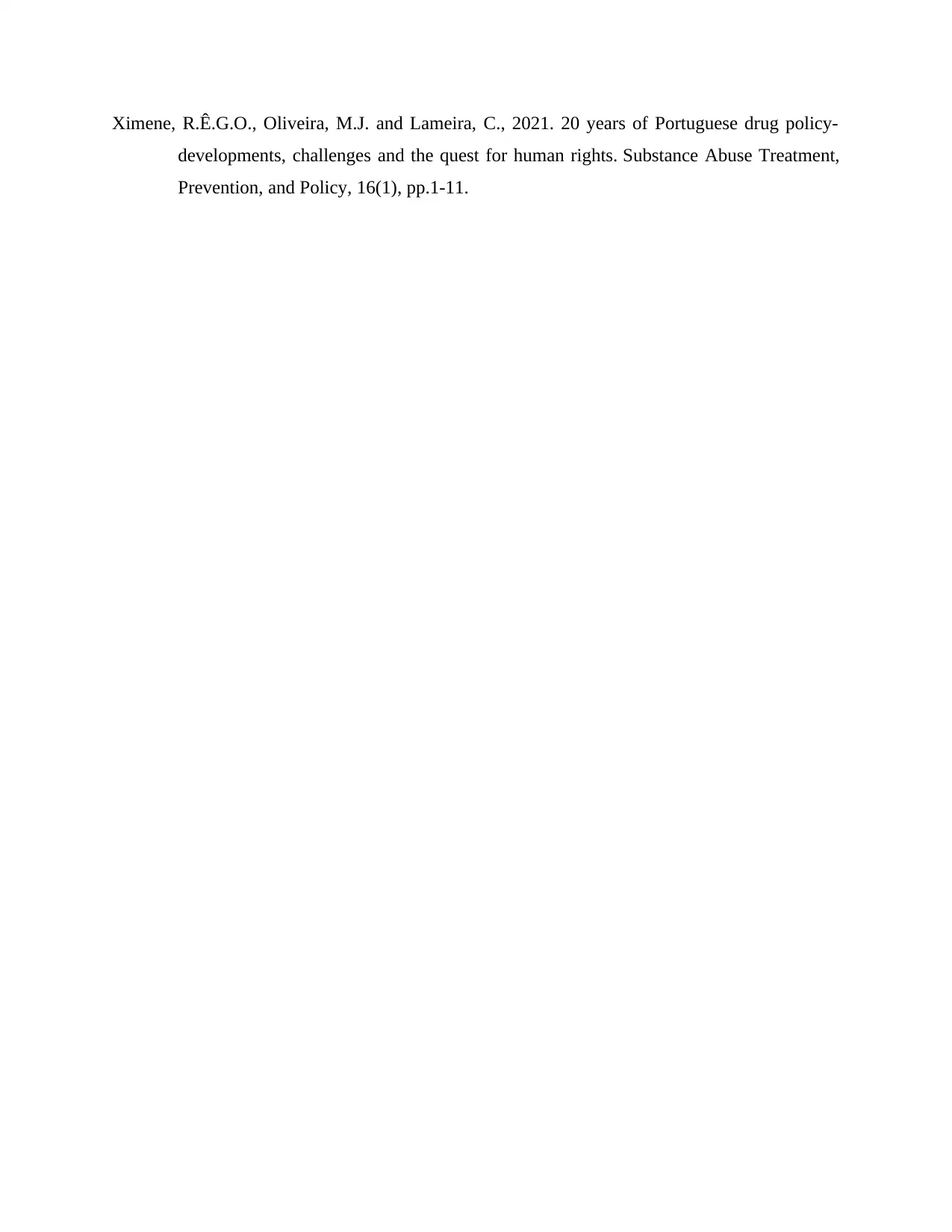
Ximene, R.Ê.G.O., Oliveira, M.J. and Lameira, C., 2021. 20 years of Portuguese drug policy-
developments, challenges and the quest for human rights. Substance Abuse Treatment,
Prevention, and Policy, 16(1), pp.1-11.
developments, challenges and the quest for human rights. Substance Abuse Treatment,
Prevention, and Policy, 16(1), pp.1-11.
Secure Best Marks with AI Grader
Need help grading? Try our AI Grader for instant feedback on your assignments.


REFERENCES
Books and Journals
Books and Journals
1 out of 12
Related Documents
Your All-in-One AI-Powered Toolkit for Academic Success.
+13062052269
info@desklib.com
Available 24*7 on WhatsApp / Email
![[object Object]](/_next/static/media/star-bottom.7253800d.svg)
Unlock your academic potential
© 2024 | Zucol Services PVT LTD | All rights reserved.


